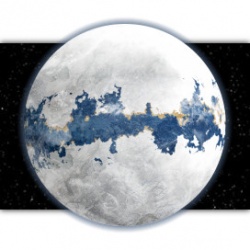
|
| Caina
|
|
Mid Rim
|
|
Hutt Space
|
|
Cocytus System
|
|
Imperius
|
|
Bolgia Satellites (10 moons)
|
|
R-11
|
|
21 standard hours
|
|
372 days standard days
|
|
Terrestrial
|
|
12,300 km
|
|
Type I (Breathable), high traces of nitrogen
|
- Tundra
- Ice Caps
- Subarctic
|
|
Heavy (1.3 Standard)
|
- Mountain Ranges
- Tundra
- Ice Sheets
- Glaciers
- Oceans
|
|
None
|
|
|
|
Basic
|
|
2.13 million
|
- Daemon (Capital)
- Cervus
- Sartis
- Calynos
- Lusid
|
- Foodstuffs
- Technology
- Exotics
|
|
|
|
Scholae Palatinae
|
Caina is the fourth planet from Imperius sun (1.9 AU) in the Cocytus System. It is an arctic wasteland of a world. It has remained as such through its entire existence a mining operation with various levels of success depending on the market value of the minerals and ore discovered within the planetary crust. Former home planet of Dorimad Sol it now has limited occupation by Scholae Palatinae, specifically House Excidium, though their influence is still present.
History
Since the original charting of the Cocytus System during the Old Republic era, some time before the rise of Darth Revan, the resources of the planet have been in demand. A large number of corporations turned their attention to the frozen planet in hopes of striking a rich vein as they harvested minerals and ore from the large polar caps. As such, despite its glacial atmosphere, Caina evolved into a profitable mining colony and would remain so for years until increased pirate activity would eventually drive the corporations and mining activity away.
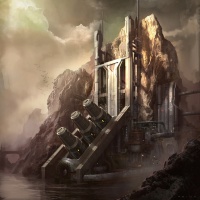 Mining colony on Caina
Mining colony on Caina
Lost, and seemingly forgotten, Caina would progress at its own pace over the next four thousand years. Slowly many of the glacial masses would seal the vast network of tunnels and mines as continued movement by the glaciers and the planets tectonic plates collapsed many of these networks and pushed new, richer veins to the utmost layer of the crust. Over time, the planet rejuvenated itself and became wealthy in natural resources, once more.
During the reign of Emperor Palpatine, the planet was chartered once more by the Empire as a mining colony. Vast Imperial contractors approached the planet, hoping to strip the fertile lands and mines dry of their precious ore for fabrication before later finding itself coating star fighters and capitol ships alike. While it did not replicate the durability of cortosis, it was rumored the unique metal harvested from the planet had an abnormal ability to resist blaster fire when treated properly; a discovery designed and documented by the Kuat Drive Yards.
With renewed activity in the sector, and miners striking new veins of profitable metal daily, pirate activity of the sector increased almost two hundred percent. Ignored initially, the pirates became emboldened by the Empire’s blind eye and struck out at several Imperial vessels. These attacks were reported immediately to the Sector Governor, or Moff, and his retribution was sure and swift. Traffic in and out was interdicted by the Moff’s Fleet, allowing his Task Force to purge the pirate threat from the nearby area. However, this three year long campaign had an averse effect on the market, driving the value of the material to practically naught.
Holding no economical value, history repeated itself and the colony withdrew from the planet a second time, leaving behind only a minimal amount of individuals whom produced just enough material to sustain themselves. Realizing the planet held relatively little value, the Moff pulled his ships out of the system leaving it to its own demise. Settlers hoped that with less Empire involvement the traders and miners may return. Alas, new resources had been discovered elsewhere in the galaxy that were easier to mine. And located in much warmer climates than the frozen polar caps of Caina.
The colonies left behind in the wake of the Imperial withdrawal slowly fell into disarray until an Envoy of the Brotherhood, Consul Cuchulain Darkblade Palpatine claimed the entire Cocytus System as his own under the banner of Scholae Palatinae. He would placed numerous leaders upon the planet in an attempt to stimulate the once booming economy, but results would never come until after his reign. Dakari Palpatine, a powerful Quaestor destined to one day be Emperor, would rehabilitate the planet’s economy and productivity by forging its denizens into craftsman and warriors. He used the planet’s harshness and cruelty to create a determined nation whom would not only mine on his behalf, but fabricate and forge new materials that could be used upon different planets to create necessary goods for use and trade. This ensured the planet would remain as a mining colony under the guidance of the Obelisk House But the planet would not go unchanged. During the year of 27 ABY, the Yuuzhan Vong would invade the Cocytus System and use the narrow, warm belt of lands across Caina’s equator to establish their primary camps. As the miners of the colony only used tools, not technology, their lives were spared as they were herded into enslavement camps and utilized only during sacrificial ceremonies. However, their land would undergo unnatural changes leaving traces of Yuuzhan Vong culture across the central lands. New vegetation and foreign structures, succession pools and damuteks, were erected as the alien invaders rooted themselves upon the planet’s surface.
These structures, and changes, would remain upon the planet forever. Despite the successful campaign led by Obelisk Primarch Koskian d’Tana during the reign of Emperor Phoenix Olkyssagh d’Tana Palpatine that would rid the invaders from the planet and, eventually, the Cocytus System.
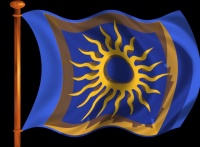 Dorimad Sol Flag
Dorimad Sol Flag
Just as operations began to operate again on the icy planet and the mining colonies began to see marginal gains, things would once again change. As Clan Scholae Palatinae was declanned and restructured as a House, House Dorimad Sol itself was dissolved. Leaders of the former House would be recalled back to another planet in the system, Judecca, as it remained the headquarters for the former Clan. Only a small set of influential leaders backed by Scholae Palatinae would be left on the planet to keep tabs on the mining operations and represent the planet.
Physical Geography
Continental
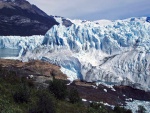 Unfrozen lands of Ceart merging with the glacial caps to the north
Unfrozen lands of Ceart merging with the glacial caps to the north
Ceart
One of two thin strips of considerably sized land uncovered by the polar caps of the planet, Ceart is host to a considerable amount of the population of the planet. Running parallel to the equator, the land starts in the east as a large piece of land; however, as it runs towards the west the land begins to narrow and twist towards the north. At one point the land merges with the glacial caps before turning back towards the south and curling in towards itself.
Originally, these lands were desolate and bleak. Minimal amounts of foliage and ruff was available for agricultural use, though enough remained to sustain a minimal amount of populace. As it was near the equator, the mean temperature was fifty five degrees; however, recent changes to the environment have seen record high temperatures in the sixties appear.
Change, however, did not come without a price. The crude, hard changes upon the planet came at the hands of the Yuuzhan Vong whom conquered the planet’s token defenses and extensively modified the western tip of Ceart to host their favored reformations. Several of the lakes were crafted into succession pools used to support a numerous amount of damuteks that served as barracks and chambers for the alien invaders. Additionally, several fields were sowed so the sentient beasts could establish a supply train as they overtook the Mid Rim system. Amongst these grown prizes were amphistaffs, crab armor and lambent crystals. Temperatures on the continent range from 35 degrees F to 65 degrees F.
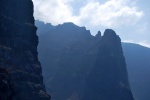 View of the cliffs on the east end of Bith-Bhuan above the sea
View of the cliffs on the east end of Bith-Bhuan above the sea
Bith-Bhuan
One of two thin strips of considerably sized land uncovered by the polar caps of the planet, Bith-Bhuan is host to a minimal amount of the planet’s population. Running parallel to the equator, the land starts in the west as a large, triangular shape of land; however, as it runs towards the east, the land begins to narrow and weave to the north and south, creating a series of seas between Bith-Bhuan and its sister continent of Ceart. Eventually the land comes to an end at a cliff. The sudden sheer of rock is believed to be the remnant of further tract of land that broke free due to tectonic shifting - forever being claimed by the deep, blue-grey ocean.
While a considerable amount of usable land was shaped by the Yuuzhan Vong, those whom dwelled upon the bleak, wilting tundra to the south were unaffected. The alien invaders did not drive their changes towards the South, and it is believed that change was stifled by Scholae Palatinae’s crusade against the Yuuzhan Vong in an effort to recapture the Cocytus System.
Several large battles did occur on the southern continent, however, and the damages of countless skirmishes can be seen from the sky. Much of the land that had once held life-saving vegetation is charred and burnt, lost in the heat of battle. Other landmarks are even less appealing as large mounds of dirt signify the unmarked, mass graves of both Yuuzhan Vong and soldiers of the Militia and Legions. Temperatures on the continent range from 30 degrees F to 55 degrees F.
Islands
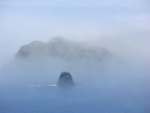 Ui Neill Island through its persistent cloak of fog
Ui Neill Island through its persistent cloak of fog
Ui Neill
One of three islands nestled between the two, primary continents not composed of ice and ore. Ui Neill is the largest and most distinct of the trio, its square shape and placement between the two tendrils of Ceart and Bith-Bhuan. It is believed to be the absolute center of the planet from the North, East, South and West.
Its shores are lined with glacial rocks of great enormity, their blue-purple hue casting a gloomy, yet mystical quality in the perpetual fog surrounding the island. The fog is believed to be a bi-product of an active chain of underground volcanoes whom heat the water, despite the cool atmospheric temperature of the planet. Only one break can be located in the halo of deadly rocks, extending in - as a channel - before a sharp left redirects the flow of water towards the actual center of the island.
The environment upon the island is restricted to a collection of scraggly, pathetic trees and shrubs, scattered amongst the rocky soil and patches of snow. Though the plants that do thrive upon the island do yield exotic fruits or spices that can be useful for sustenance or, in the case of the spices, rituals requiring narcotic substances. This exotic array of vegetation and the sharp angles in the channel are evidence that points to the island being the legendary stronghold of King Neill’s sons.
Temperatures hover around an approximate 65 degrees F.
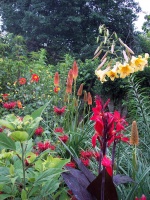 One of the multiple lush groves protected on Corran Tuathail
One of the multiple lush groves protected on Corran Tuathail
Corran Tuathail
Resting to the west of Ceart’s twisting end, lies the island of Corran Tuathail. Originally heralded as an extension of the continent, it was later determined the land - despite the shallow sand bar connecting the two land masses - was environmentally differing from its nearby neighbor.
Bridged to the continent of Ceart, an unnatural expanse of sand hides below a thin layer of ocean water. The white sands accent the blue-green ocean waters, giving it a shimmering and inviting appearance to those who stand upon either shore. These inviting waters, however, hold a lethal secret. Due to the ten moons in orbit, the waters are continually pulled at; forcing the tide to rise and drop in a devastating pattern. Should one attempt to cross the paths without assistance of a seaworthy vessel, they would be swept under by the tides and lost to the sea.
Though, when one does make it across they are greeted by a diversified expanse of land. The hardest piece of land to settle, the island of Corran Tuathail was allowed to prosper without the interference of miners. Despite the cold temperatures, numerous delicate and fragile plants emerged from the soil. Many of the bountiful groves hold exotic fruit and vegetation in which only one planet was known to have also grown: Alderaan. These crops are wilting under the new found changes of the Yuuzhan Vong invasion, forcing those whom profit from their existence to resort to dramatic efforts to stabilize the environment. There are efforts to construct a crystalline structure over the island to preserve the rare goods that have never materialized.
Temperatures range from 45 degrees F to 60 degrees F.
Uasal
 Island of Uasal
Island of Uasal
The last of the island trio, Uasal rests on the far east end of the continent of Bith-Bhuan. Barely registering as an island, the small mass of land is densely populated by a variety of hardwood trees. The number of trees - a rarity upon the surface of Caina - plays host to a wide variety of game that is uniquely located on the small island.
It is believed that the island is capable of sustaining such amounts of life due to its ability to manufacture clear, drinkable water from the ocean water that courses into a small river mouth. While the actual method has never been documented, it has drawn the attention of scientists whom specialize in the theory of desalination.
Temperatures range from 35 degrees F to 50 degrees F.
Island Chains
Poit
 Island of Poit
Island of PoitA chain of three islands resting to the north of Ceart’s shores. The land mass is primarily created of saturated soil commonly referred to as peat bog, or muck, among the natives. Due to its fertile environment, the islands are host to a variety of plant life; though, notably, none of the vegetation grows over six feet in height.
The land is deemed ugly, as few of the bushes break from the brown and green canvas covering the land. Additionally, few of the trees are crisp and straight, most are twisted and distorted as if from a childhood nightmare. While locals accredit it to a myth concerning a dark beast, the Dark Siders of Scholae Palatinae have deemed the chain as a natural focal point for Dark Side energies; however, it does not permeate a definite unease or power like Korriban or Lehon. The island chain maintains an unnatural temperature of 33 degrees F.
Cairdeas
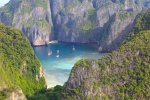 Lagoon of Cairdeas
Lagoon of CairdeasConsisting of two islands in close proximity, the chain of Cairdeas lies in the southwestern hemisphere, south of the shores of Bith-Bhuan. In the shape of two, facing crescents the land creates a natural barrier for a small lagoon between them; however, an underwater passage - unknown to many - connects the lagoon to the outside ocean; allowing natural predators to invade the waters when the pass is clear.
Neither island is hospitable, even though a small collection of natives relocated to the lands during the Yuuzhan Vong invasion of the planet. To sustain themselves, the once hearty miners adapted to a life of seafaring. Literally, harvesting their necessities from the seas and the nearby lagoon. With their presence introduced into the natural order, several new species of animal have taken root upon the islands. While majority of the animals were bred for domestication or food one or two predators have emerged to create balance. Yet, these creatures have yet to prove capable of taking down anything more than the occasional farm animal.
Temperatures on the twin island paradise hover at approximately 65 degrees F due to a warm ocean current.
Brathaireil
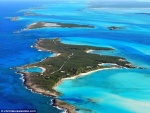 The six island chain that makes up Brathairreil
The six island chain that makes up BrathairreilA chain of six islands to the far east of the map, past the shores of Ceart, rests the Brotherly Islands. Or, as the denizens of the planet know them, the Brathaireil Chain. A grouping of fertile islands known in legend due to the differing bounties harvest upon each one - by land or sea - by six brothers. As myth would depict it, the brothers each harvested a bountiful, but singular crop each season; requiring trade with one another to prosper as a whole or find themselves lacking throughout the winter season. Scholars of Scholae Palatinae believe the legend to be myth, an old wife’s tale to introduce the importance of sharing in preparation for the cold, harsh winters of Caina.
What scholars cannot discredit, however, is the presence of the Brotherly Chain and evidence that suggests it was inhabited hundred of years ago. Before conclusive data could be collected, the alien invaders conquered the small chain and terraformed it to suit the demands needed for the introduction of an array of crops.
Brigh
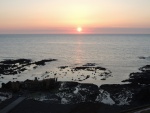 Island of Brigh with rocks emerged out on the shore.
Island of Brigh with rocks emerged out on the shore.Composed of three islands, the Chain of Brigh sets in the far, western horizon from the shores of Bith-Bhuan. The trio of islands seemingly rise out of the ocean’s fog, as if they had recently returned from a time of ancient myth or legend. Though scientific data shows a series of hot springs circulating through the chain; creating the elusive atmosphere and fog surrounding them.
A number of boulders line the shore and sit half emerged in the warm spring beds of each island. The size of the rocks seemingly decrease as one heads closer to the center, or apex of each land mass until the immense rocks are nothing more than pebbles strewn within the soft white sands spread along the coastline. The oddity of the large rocks - and their presence - is attributed to massive upheavals the planet underwent during the initial stages of Yuuzhan Vong terraforming. However, the interior of the islands were unaffected by these changes and remain a collection of matted, dense grass and the occasional shrub or tree littered across the tracts of land.
Beyond the hot springs, the lands provide no economical advantage despite their near constant temperature of 70 degrees F.
Borb
 Ice tips of Borb jut out of ice sheet
Ice tips of Borb jut out of ice sheetWithin the Sea of Moving Ice rests a small cluster of four islands that resists the perpetual pounding of their shores to offer wayward travelers their last chance of salvation should an emergency arise. Often labeled as The Fingers by the population of Caina, the four juts of land rise high into the sky, well above the flowing sheets of polar ice that break against their foundations.
Believed to be the tips of a great underwater mountain range, the cone shaped peaks are pocketed with a series of caves and bluffs to prevent detection from outside invaders or shelter abandoned travelers. Though, amid the frigid sea, the land offers no real sustenance other than several traces of minerals used in herbal compounds to dull pain and rejuvenate one’s immune system.
Though the land offers protection from near constant winds, the land remains chilled as the air hangs thickly upon the land at around 30 degrees F.
Cities
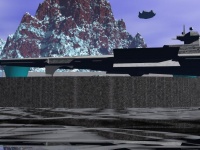 A view of the bustling spaceport at Caina's capital
A view of the bustling spaceport at Caina's capital
Daemon
The capital city and focal point of off-world trade for the planet of Caina. Unique in its architecture, Daemon’s true worth can be found within the ground it sits upon. A massive spaceport sprawls across the ground - a host of docking pads, customs stations, storage units and mechanical sheds encircling the Victory-Class enabled landing pad. The only distinctly different feature of the spaceport are the four gates - massive archways with ramps leading down - at the four cardinal directions: north, south, east and west.
The pathways lead to a complex network of mined tunnels and domiciles, or chambers, that can hold over one hundred thousand individuals; though, in times of war or peril, the facility has accommodated nearly five hundred thousand occupants. The mason work was created and fine-tuned during the Galactic Empire’s reign over the planet of Caina. A series of rich veins produced astounding results, drawing the attention of one mega-corporation whom - unable to restore the ground - expended additional resources to create an ultra-chic resort. Though the initial blueprints had been drawn up and the equipment delivered, the presence of pirates drove off potential investors and the corporation abandoned the project. However, during the reign of then Quaestor Dakari Kaeth Palpatine, the operation was renewed by weak-minded drones under the soon-to-be Consul’s mental influence.
The archways themselves are designed as defensive holdouts against an invading army. Structuring defensive fortifications into the initial design were a personal touch of the Obelisk Consul, allowing the floor plan to bottle up a larger opposing force. Additionally, he ensured further advantage by forcing opponents through a series of tight turns and jogs that would not allow for shots from distance; effectively preventing the use of snipers within the complex. These defensive labyrinths are short lived, however, quickly giving ground to the highest levels of the underground city.
At the highest levels, those closest to the surface reside the homes and shops of the city proper. The chambers were sculpted for efficiency; thus, they lack the lavish space and opulence afforded by chambers lower in the mines. An estimated eighty percent of the population live in these initial levels and provide the most general day-to-day supplies necessary for living. Hidden just below this layer rests the richest and most ‘well off’ class of Daemon. The Nobles of Caina have carved luxurious palaces and mansions from the bedrock hundred of feet beneath the surface - where vacant space is the most lavish of excesses. Some of the homes are built within the rock, while other clusters occupy natural, open caverns to build their homes up within.
At the lowest charted levels reside the workshops and mines in which the citizens still utilize to craft product and patch custom work brought to Caina’s expert blacksmiths. A series of natural furnaces are created by the planet, allowing metals to be heated to unnatural levels - even to the point where additional metals can be melded together to create hybrid products. Several prominent pieces of weaponry have come from these workshops before filtering into the Brotherhood itself. In addition to fine workshops, the city has also utilized the lowest level to safeguard their valuables. A series of vaults were created within the basement level and are guarded by servants, or instruments, of Scholae Palatinae - the Royal Clan of Judecca. Beyond the fortified entrances, these troves of valuables are the second most heavily guarded resources in the underground metropolis.
It is also rumored that beyond the guarded vaults a series of passageways lead further into the bowels of the planet - where only members of the illustrious Royal Clan are allowed to walk. The true nature of what Dakari found deep in those caves remains a secret to all but the Emperor after the closing of the former House Dorimad Sol.
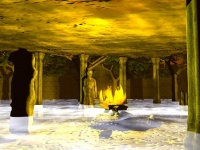 The newly constructed Town Hall
The newly constructed Town Hall
Cervus
Leveled during the invasion of the Yuuzhan Vong, the city of Cervus stands as a shell of its former self. Once proudly erected in an Athenian style of opulent temples and open-air villas, the city has been turned on its head. The great, white pillars of stone have been knocked asunder by the strange alien invaders; some of the stone has, in fact, been dissolved by their chemicals and altered changes upon the planet’s surface.
Though, amid the wreckage, the denizens have found hope. At the center of their previous existence they have erected an enormous covered shelter by collecting the remaining pillars and stone that had laid scattered about the ground. This building, or foundation, has been labeled as the Town Hall and from it all growth - mental and physical - stems.
Under the direction of a Cerean, the town has begun to reawaken in the wake of their tragedy: children play, crops are sown, old men argue their philosophical differences. In addition to their mental and emotional growth, a detailed outline has been assembled as they rebuild their once pristine habitat within the new environment introduced upon the continent of Ceart. Already, the craftsmen have been commissioned to craft the Noble’s Merit Awards - blades, shields, gauntlets, helms - for the forthcoming ten-year. The money awarded for the fine items not only sustains the needs of the village, but gives them the funds necessary to continue rebuilding.
To the north of the Town Hall a great coliseum has been erected. While failing in comparison to the monolith upon the surface of Judecca, the arena is more than serviceable for the seasoned warriors and duelists upon the icy planet. To the east of this structure a new academy is being founded to instruct both children and adults in the theories and necessities of life beyond the field. The structure is simple in nature, rising only three stories in height and spanning two hundred yards in length and width. At the center rests a great stage to be used by aspiring actors and novices of the craft.
Additional building has been planned, but has yet to come into fruition: temples, monuments, homes, workshops. Though, it is believed under the steady gaze of the Cerean all of the town’s plans will succeed.
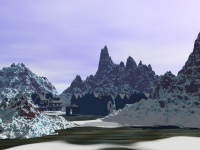 The snowy town of Sartis
The snowy town of Sartis
Sartis
A primitive outpost located in the far depths of the northern hemisphere upon the polar ice. Once thought to be a lost civilization due to its existence being unrecorded and visually hidden by the snow and peaks of the north, Sartis remains a banner of a once great nation.
Before the advancements made in mining, a great tribe of individuals roamed the lands of the north - using the land to sustain their way of life. The nomads followed a four-legged, antlered beast that not only provided meat and warm furs, but it led the small nation from water hole to water hole. This symbiotic lifestyle continued as both the animals and sentient humans flourished upon the open tundra. At the pinnacle of their achievements, the first Republic mining vessel landed upon the planet’s surface and began to alter, and shape, their future progression. The tribe splintered as the majority headed south for the wonders and riches promised by the intergalactic travelers. The remainder returned to a known safe spot upon the tundra to establish a more permanent way of life, less dependent on their symbiotic relationship, yet more in tune with the ancient traditions they had upheld for thousands of years.
The city, or camp, is constructed from a meager amount of wood provided upon the plains and the walls are made of either mud or animal pelts. The crude fashioning keeps the harshest of elements from penetrating their abodes; however, it does not provide a steady indoor temperature and is a primary factor in the high mortality rate within the city. The highest structure within the entire encampment is a two story building of great enormity which the locals have labeled The Lodge. It is here that the town gathers each night as they share in a tribal feast and conduct the business before them in a democratic vote.
The simple nature of their buildings and lifestyle make the city almost unworthy of general recognition if it were not for the city’s close proximity to the Crystal Caves. The nearby caves are an incredible sight as the pure arctic light filters in through several openings, before refracting through a thousand different crystals to create an illumination unimaginable at such depths. While not directly contributed to the people of Sartis, it is believed the nomads settled nearby the caves as reminder of their once great nation.
Calynos
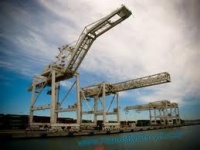 Port of Calynos
Port of CalynosThe southernmost center of civilization upon the surface of Caina. Calynos resides in the center of a collection of small city-states; acting as the capital, or center, for trade and discussion amongst the area’s inhabitants. The area is, seemingly, sparsely populated due to the small number of citizens spread over a great amount of land.
Located on the edge of a great waterway, Calynos is a town of simple construct. The homes are constructed with carved stone from the vast quarries of the South, but do not rise higher than a single story. It is believed this is due to the walls being a single block instead of being fashioned from many small blocks – as the population lacks the technology to lift the great slabs, but possesses the machinery to haul the stone. To construct a proper roof, the trusses and covering is constructed from light, tempered tin. It is said that a queer, ringing tone erupts from the roofs when rain beats down upon its surface. The last, distinct attribute of common housing in the town is that the homes lack windows and doors. Artificial lighting – originally candles before technological advancements were introduced – dispels the darkness within. Unique in construct, however, are the portals permitting access into homes. Each home has an entry hall that leads ten feet into the home before angling ninety degrees to either the right or left and continuing another ten to twenty feet, before an opening appears leading into the house proper.
The remainder of the city is ordinary beyond explanation except for the large harbor located on the northern perimeter. A massive, jagged rock bar breaks the surf before it can slam into the soft, white sand shores of Calynos. The natural barrier, with two openings that permit vessels out, has created a deep pocket of calm water. In the past, this port had been used to ship products from the city and conduct trade with the other colonies. With the introduction of speeders and personal crafts, however, the port has fallen into a strictly commercial role. One note of mystery, though, is the construct of the great piers; massive pillars and planks of wood that is not native to the surface of Caina.
Lusid
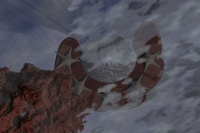 The Vongformed City of Lusid
The Vongformed City of LusidAt the conclusion of Scholae Palatinae’s attempt to reclaim the Cocytus System from the Yuuzhan Vong, housing and shelter for the inhabitants of the planet Caina was in short supply. To offset this deficiency then Consul, and Emperor, Phoenix d'Tana Palpatine ordered the soldiers of House Dorimad Sol to secure the largest cluster of alien structures for permanent settlement.
Surrounding what had once been the Great Lake of Decroix is a massive, enclosed structure of Vong construction known as a succession pool. The self-contained facility stores the heart, lungs and kidneys of the surrounding structures. As the buildings themselves were living, the succession pool would provide nourishment and remove the waste of the adjoining facilities. Without this support, the living structures would become unusable.
Located around the succession pool, near the water, were giant star-fish shaped constructs called damuteks, rising nearly two stories into the air. Operating as any living thing, the building was dependent on water and nutrients – provided by the succession pool – to facilitate barracks for the warriors, offices for intendeds, laboratories for attendants or additional storage facilities. While several of the buildings have remained in their original state, Clan Scholae Palatinae has remodeled most of the structures into barracks; bringing in necessary fixtures such as bunks, refreshers and other necessities.
Several distinct, secure buildings also populate the area. The large shell spiraled, creating numerous interior chambers, towards the sky – three by sixteen meters in size. These structures were the last to be penetrated by the House Dorimad Sol as their entrances – gricha – were sealed. Generally, these buildings were used as temples or command structures of the Yuuzhan Vong. They have since been redesigned to act as centers for communications, food distribution, and VIP guests.
Two remaining structures, [[starwars:vivariums|vivariums], are under constant guarding. These structures were constructed as ‘clean rooms’ for the Shapers, or scientists, of the Yuuzhan Vong. It was in these facilities that careful experiments and ground-breaking bio-engineering would take place. Upon initial, cursory searches of the facilities, several Dark Jedi became infected with uncontrolled viruses which had been cultivated by a resident Shaper.
Notable Landmarks
The Blade
 The sapphire blade in the stone at the peak of the mountain
The sapphire blade in the stone at the peak of the mountainA massive formation, known as the Heart of Caina, resting along the equator of the planet. Known as a former deployment point of the soldiers of Dorimad Sol, it is said that the retaking of the planet spread outward from this point – giving it a significant meaning to the inhabitants of the planet. More distinct, and meaningful, at the top of the rock outcropping rests a blade of sapphire plunged deep into the peak. It is rumored that when the Clan conquered the Yuuzhan Vong host upon the planet that one of the soldiers plunged his sacrificial blade into the Heart of Caina. The blade served as a memorial to the sacrifices made on behalf of those soldiers and, as a banner, sign that the land was now under the control of the then reopened House Dorimad Sol.
It is said that when the sun begins to descend over the horizon that the sun will penetrate the depths of the blade, refracting a gentle, blue light over the country side. And that on the anniversary of their freedom the light will reveal the soldiers whom lost their lives, standing in formation, saluting, before The Blade.
Dakari’s Solitude
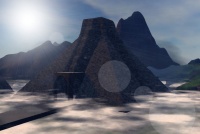 Dakari's Solitude
Dakari's SolitudeThe original headquarters of ancient Dorimad Sol. The small, Spartan temple was renamed in honor of long standing Quaestor Dakari Kaeth Palpatine – whom was the last commander of the House before it as closed. It was said that even after the House closed and his elevation to the Clan Summit, Dakari would revisit this mystical temple to meditate and reflect on decisions that would lead Scholae Palatinae into a second Golden Age.
Built into the face of a mountain, using the natural erosion of a cave, the temple reaches back from the mouth of the cavern to the deep bowels of the mountain. A narrow, defensible tunnel leads from the entrance, sloping downward, before it opens to the first cavern. This facility served as a training ground and defense post should the House ever come under ground attack. In the rear of this room are two tunnels: one leading to the barracks and kitchens, the other towards the altar of Dorimad Sol and the Quaestor’s chambers.
The altar of Dorimad Sol is the deepest of caverns. Within it rests a stone altar that measures three feet by six feet. Resting on the black stone is a long, white silk sheet that rests under the remnants of a shattered Sith Sword; presumably the blade of the notorious sword master, Dorimad Sol. The blade is broken into seven pieces, but the hilt remains intact with the emblem of the sun – Dorimad Sol’s Coat of Arms – upon the pommel.
Kas’im Citadel
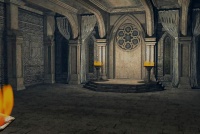 Combat hall at Kas'im Citadel
Combat hall at Kas'im CitadelBuilt at the conclusion of the Reclamation of Judecca, former Emperor Braecen Kaeth requested the resources to build a training facility specifically for those whom wished to serve as his pupils, learning the Art of the Saber.
The man responsible for training Lightsaber Studies upon the surface of Lyspair, a moon of Antei, he has dedicated countless years to perfecting his form and learning the ins and outs of the additional forms of the Brotherhood. With direct access to the records and instructions used to build the Brotherhood’s guide to the art, he has made a scholarly pursuit to know not only the ‘known’ forms, but to reconstruct the countless variations that had sprung up throughout the galaxy over the course of thousands of years.
The Citadel is a building of epic proportions, fashioned after the massive Cathedral of Light within the Jusadih System. The building reaches fifty feet into the sky with countless spires and towers erupting from the base of its roof. To support its massive weight and ensure its structural integrity, countless buttresses have been constructed along the length of the building – furthering its appearance as a building of considerable size. At the south edge of the building rests a series of steps that lead to a plateau – twenty feet by twenty feet – before massive ten foot doors of a rich, foreign wood that has been sanded and stained to a deep, glossy red – accenting the white limestone of the building’s exterior.
Upon entering the structure, a massive hall greets one’s eye. The hall is devoid of any objects except for various items arranged along the perimeter walls: weapon racks, cabinets, tables and stools. The flooring, however, is constructed of a rigid, textured material most commonly found in a training dojo. The flooring provides adequate protection for the warriors whom come to learn the art of sparring and the lightsaber.
To the rear of the structure are two more doors not unlike those at the front of the Citadel, but of lesser size. Past these doors are the chambers of the residing mentor. Past those doors, lining the walls, are ancient manuscripts pertaining to lightsaber combat or historical references that include the use of a blade. While the knowledge is largely incomplete, it is the duty of the Citadel’s Master to continue pursuing the knowledge necessary to craft the willing of Scholae Palatinae into bladeborn.
The Citadel was destroyed by Caina Colossus, and its rubble melted following the deployment of the FWEC bomb by Elincia Rei. A new Citadel has begun construction over its remains.
Whitestone Glade
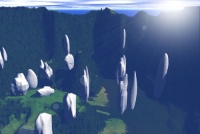 The Mysterious outcroppings at Whitestone Glade
The Mysterious outcroppings at Whitestone GladeWithin one of the equatorial valleys resides an expanse of lush, green grass dotted with countless boulders that break up the smooth, fertile land. The massive rocks, unlike those common to Caina, are a bright, radiating white. These white stones have only been found within this lone valley; perplexing scientists who attempt to explain how such an anomaly came into existence.
Creating further dismay among the Dark Jedi of the Cocytus System is that the stones seem to create a blanket of static, or white noise, to those who use the Force in close proximity. Attempts to sense life, send or receive messages or affect another’s mind in this valley will be unsuccessful.
Sea of Moving Ice
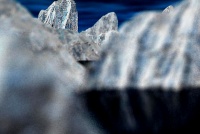 The shifting ice.
The shifting ice.Due to the altering of the ecosystem by the extra-galactic invaders, the northern ice caps of the planet have begun to melt as the average temperatures of the planet begin to climb. This has resulted in large chunks of the polar cap falling into the ocean, before breaking into smaller, floating sections. The result is a blanket of ice chunks that make nautical travel impossible from the northern continent to the glaciers.
It is not uncommon for sailors, or seafarers, to fall victim to the ice should they travel too closely to the treacherous sea of moving ice. Despite the rising temperatures, the edges of these ice formations can wreak havoc on vessels without the proper plating.
Tomb of Bones
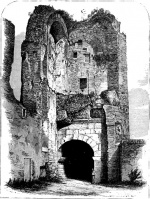 Archaic archway to the path of the Tomb of Bones
Archaic archway to the path of the Tomb of BonesNear the city of Daemon, capital city of Caina, rests an archway of intricately wrought stone and iron. Rippling through the stone are various veins of ore mined from the depths of the planet, separated by dark bands of metal; giving the opening an archaic appearance.
The opening leads to a steep, downward path that leads into the planet itself. A series of torches burn eternally along the path, casting the corridor in a shadowy, flickering darkness known to send a chill down one’s spine. Eventually, the path levels out, opening to a labyrinth of twisting paths meant to act as a natural barrier against intruders and thieves. Of a hundred fake trails of varying design and construct, one path is true and leads to the temple of Fallen Kings.
At the end of the labyrinth, the path is barred by an ancient door requiring a key held by the ruler of Daemon. This key grants the bearer access to the catacombs of the fallen Lords of Daemon, a chamber reserved for the dead to be honored eternally. The cut chambers process down a long, elegant hall to the inner sanctum of the cemetery known as the Temple of Bone. A shaft of sunlight, channeled by various mirrors through a series of shafts leading to the surface, sprawls down upon a shield bearing the mark of Daemon. Surrounding the shield are countless candles, which are lit in honor of a fallen king or the appointment of a new ward – assistants whom serve the King eternally – of the Emperor.
It is here that, should an Emperor fall, the rulers of the Cocytus System are buried.
Grandfather Tree
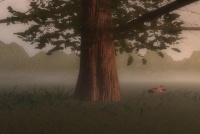 The Grandfather Tree.
The Grandfather Tree.
An ancient tree of great proportions, the object reaches into the sky to a peak of one hundred feet. The base of the tree reaches fifty paces across with a circumference of nearly three hundred meters. The lower branches, capable of holding the weight of a star fighter, weave in and out of the goliath base and are covered with countless smaller branches covered in foliage.
This tree was the only biological specimen to resists Yuuzhan Vong terraforming. It is believed that the antiquity of the tree has imbued it with powerful resistances against poisons and damaging insects – perfect evolution throughout countless centuries.
Legends state that the ancient population buried a great treasure beneath the tree when it was but a sapling, giving it the power to last eternally.
Forgotten Mines
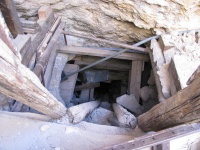 Shaft of a mine dilapidated and long forgotten
Shaft of a mine dilapidated and long forgottenSeveral times throughout the history of Caina miners have probed deep into the planet, harvesting its natural deposits of ore and mineral. Some of the veins ran deep, others were shallow and yielded poor quality. What both share in common, however, is that the institutions whom mined these materials did not fill, record the location of, or block the entrances to these structures.
Untold mines remain uncharted across the surface of Caina. Not only are these occurrences extremely hazardous to travelers whom are unaware, but are notoriously poor for moving ground forces of extreme number, and weight, across the surface. In an attempt to negate this tactical disadvantage, the House of Dorimad Sol has begun to chart these paths. It is their hope that they can use these hollowed paths for their advantage should the planet ever come under assault once more.
Outlook
Political
 Dorimad Sol Flag of the defunct house that still pulls influence
Dorimad Sol Flag of the defunct house that still pulls influenceIn the beginning days of Caina’s growth, the industrial mining companies who held the largest contract with the Republic or Galactic Empire ascended to the position of power. In addition to overseeing their own operations, the companies would use their wealth, or clout, to sway the direction of activities going on upon, and below, the surface of Caina.
However, the planet spent far more time under its own rule, establishing its own system over thousands of years. During this time the population would gather into nations, swearing their fealty to the sovereign rules of the planet. Claiming lordship of all nations, the Kingdom of Daemon the Black would rule absolute throughout history. Under the omnipotent ruler the nations would be broken into sectors, then regents under the control of his court.
This political system would remain until Cuchulain Darkblade Palpatine claimed lordship of the Cocytus System. It would be at that point in time the heir of Daemon would swear his fealty to the then Consul – creating an ally capable of backing the Royal Clan as they entered the political fray of Judecca. For their contributions, the city and her King would be handsomely rewarded – allowed to continue their way of life until the days of the Yuuzhan Vong.
During the invasion of the Yuuzhan Vong the leader of Daemon would be slain. With no heir, the choice of successor would be given to then Consul, Phoenix d'Tana Palpatine. Carefully modifying the bylaws of the System and Clan, the Emperor established the Quaestor of Dorimad Sol would hold three positions: House Leader, King of Daemon & Surface Marshal. With a contingent of powerful Dark Jedi, four Legions of troopers and the right to rule – granted by the Emperor – the man whom occupied the position of Quaestor would be allowed to establish a powerful base of power for Clan Scholae Palatinae.
With the declanning of Scholae Palatinae, being reformed as a House, and the resultant closure of Dorimad Sol, there are few if any Dark Jedi on Caina at any time. While a Senator still represents the planet in the system wide government, a new government was established in Daemon in the wake of the events. Legitimized by the outgoing King of Daemon, this new ruler remains loyal only to the reigning Emperor.
Military
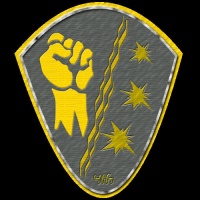 Seal of Cainian Guard that plays a vital role in military and sector security
Seal of Cainian Guard that plays a vital role in military and sector securityThe feudal, warring nature of Ciana has not been without gain. During the Yuuzhan Vong invasion of their planet, the people rose up to fight as a unified force under their leaders. While the forces were unable to defeat the invaders, they were capable of creating a stalemate to delay their foe until Scholae Palatinae could mobilize an effort to retake the planet.
The war proved difficult to the inhabitants as they suffered numerous losses of both troops and officers in the battle. What resulted, however, was a culling – of the ignorant and weak – from the planet’s warring population. The population adapted to life as warriors, gearing themselves into a cohesive unit while those unable to fight assisted in caring for the wounded, producing weapons or acting as messengers between the armies. At the conclusion of the war, the best and brightest would be recognized for their efforts – receiving new commands, and duties, within the kingdom that best utilized their new-found skills. Thus, the future of the militia was guaranteed to be successful.
Currently the Cainian Guard within the Imperial Scholae Guard is stationed on the planet near the city of Daemon. They protect the planet and city which is the center of commerce from the region and economically important to Scholae Palatinae, as well as support the current King of Daemon as he maintains order on the planet as necessary for system wide security.